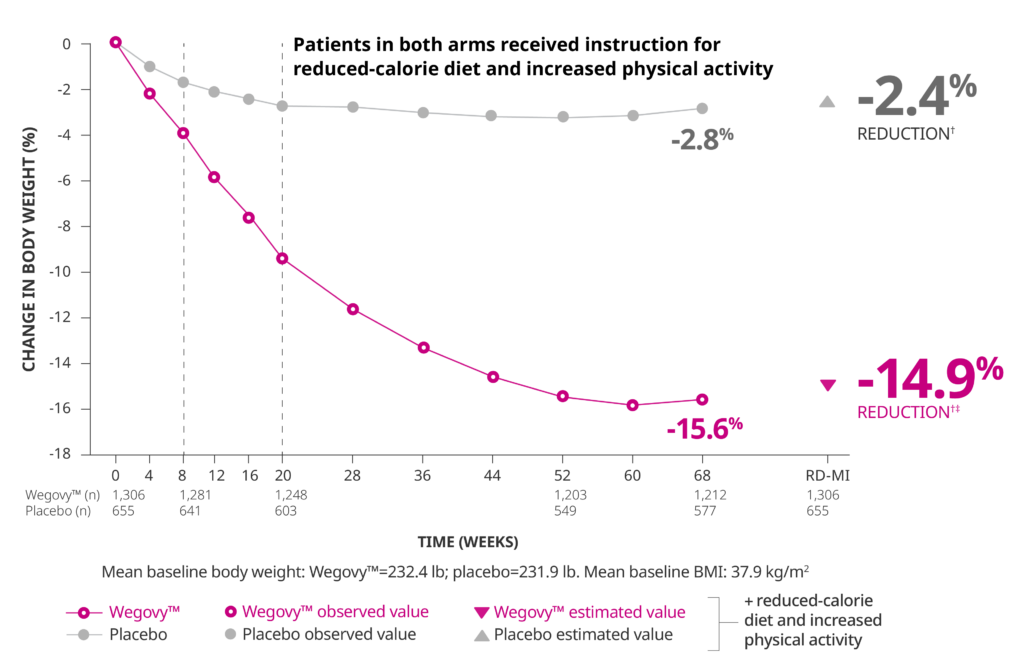How much weight can you lose on Wegovy?
Wegovy or semaglutide was approved by U.S. Food and Drug administration for use for weight loss in adults with obesity who have at least one weight related condition such as high blood pressure, type 2 diabetes or high cholesterol. It should be used in addition to a reduced calorie diet and increased physical activity.
Approximately 70% of American adults are obese or overweight. Being obese or overweight is associated with increased risk of heart disease, stroke and diabetes among other medical issues.
How does Wegovy work for weight loss?
Wegovy or semaglutide works by mimicking a natural hormone called glucagon-like peptite-1 (GLP-1) that acts on areas of the brain that regulate appetite and food intake. It also slows down the emptying of you stomach, thus making you feel full sooner. Together, it helps you feel less hungry, causing you to eat less food and lose weight.
Wegovy weight loss in clinical trials
In Step 1 clinical trial, 1961 patients were enrolled that were either obese or overweight and had high cholesterol or blood pressure. Patients with type 2 diabetes were excluded from the trial. The patients were divided into two groups: one group who will receive Wegovy and one group who will receive a placebo. Both groups were encouraged to eat a reduced-calorie diet (~500 calorie deficit) and increase physical activity. These patients were followed for 68 weeks for weight loss.
The average weight loss after 68 weeks was a decrease of 14.9% in Wegovy group compared to just 2.4% in placebo group. In absolute terms, the average weight loss after 68 weeks in the Wegovy group was 33.73 lbs (15.3 kg) compared to just 5.73 lbs (2.6 kg) in the placebo group. 85% of patients taking Wegovy had weight loss of greater than 5%.


In conclusion, Wegovy was associated with a significant weight loss of about 15% after 68 weeks, even in patients that did not have diabetes. 85% of patients taking Wegovy had a weight loss of more than 5%.
Wegovy dosing schedule for weight loss
Take Wegovy as prescribed by your doctor, It is typically started at a lower dose and increased in 4 week intervals. If you do not tolerate a dose increase, you should consider staying on the current dose for an additional 4 weeks and then try again.
- Week 1 – 4: 0.25 mg once weekly
- Week 5 – 8: 0.5 mg once weekly
- Week 9 – 12: 1 mg once weekly
- Week 13 – 16: 1.7 mg once weekly
- Week 17 and ongoing dose: 2.4 mg once weekly
Wegovy should be injected once weekly, on the same day each week. It can be injected at any time of the day. Inject subcutaneously in the abdomen, thigh or upper arm. If you miss a dose and the next scheduled dose is more than 2 days away, take Wegovy as soon as possible. If the next scheduled dose is less than 2 days away, skip the dose and continue your usual dosing schedule
Wegovy side effects
The most common side effects with Wegovy are nausea and diarrhea, they are typically mild to moderate and tend to decrease over time. To reduce the risk of side effects, Wegovy is started at a lower dose and slowly titrated up.
Seek medical attention right away if you have signs of pancreatitis (inflammation of the pancreas) such as severe stomach pain, severe back pain or severe vomiting.
If you or someone in your family has medullary thyroid carcinoma (MTC) or Multiple Endocrine Neoplasia syndrome type 2 (MEN 2), you should not take Wegovy. In animal studies, ozempic caused thyroid C-cell tumours but it is unknown whether it causes the same in humans. if you are on Wegovy, you should monitor for symptoms of thyroid rumours such as a mass in the neck, trouble swallowing, shortness of breath and persistent hoarseness.
Pregnancy and Breastfeeding
Wegovy is not recommended during pregnancy and breastfeeding. It is recommended that Wegovy be stopped 2 months or more prior to becoming pregnant.
Disclaimer: We have made every effort to ensure that all information is factually correct and up to date, however this article is not comprehensive and does not contain all relevant information about the topic. IT should not be used as a substitute for the knowledge and expertise of a licensed healthcare professional. You should consult your doctor or pharmacist before taking any medication. The drug information contained herein is subject to change and is not intended to cover all possible uses, directions, precautions, warnings, drug interactions, allergic reactions, or adverse effects. The absence of warnings or other information for a given drug does not indicate that the drug or drug combination is safe, effective, or appropriate for all patients or all specific uses.